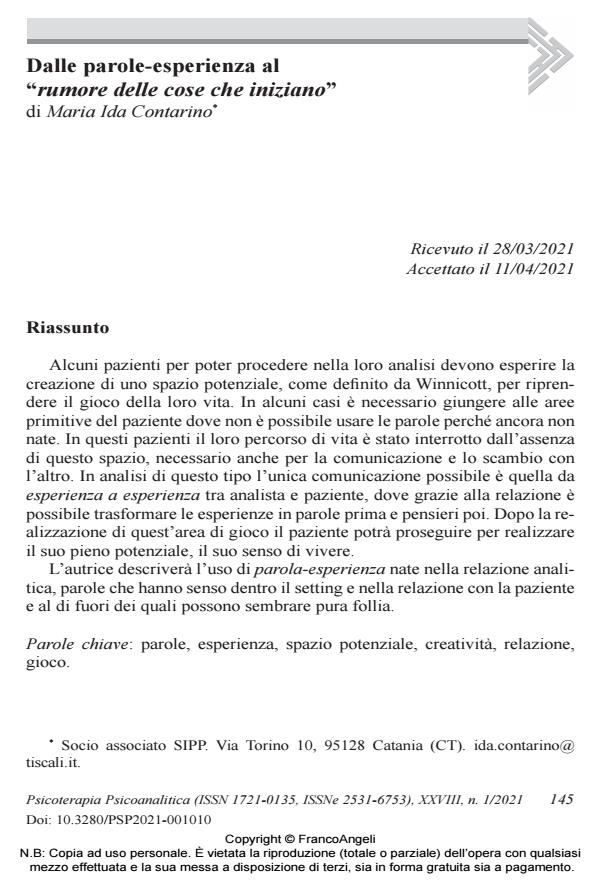From the words-experience to the "sound of the things that begin"
Journal title PSICOTERAPIA PSICOANALITICA
Author/s Maria Ida Contarino
Publishing Year 2021 Issue 2021/1 Language Italian
Pages 12 P. 145-156 File size 187 KB
DOI 10.3280/PSP2021-001010
DOI is like a bar code for intellectual property: to have more infomation
click here
Below, you can see the article first page
If you want to buy this article in PDF format, you can do it, following the instructions to buy download credits

FrancoAngeli is member of Publishers International Linking Association, Inc (PILA), a not-for-profit association which run the CrossRef service enabling links to and from online scholarly content.
Some patients, in order to be able to continue their analysis treatment, must experience the creation of a potential space, as Winnicott states, to restart their lives. In some cases it’s necessary to reach the patient’s primitive areas where words cannot be used, as they have not been generated yet. These patients are supposed to have interrupted their living process due to the absence of this space, which is essential to communication and exchanges with others. In this kind of analysis, the double bound experience between analyst and patient is the only existing means of communication. At first, within this flow, experiences can be transformed into words and then into thoughts, thanks to the relationship doctor-patient. Consequently, after achieving the game area, the patient will manage to proceed with the aim of reaching his/ her own full and potential sense of being. The authoress will describe the use of the so-called words-experience, created in the setting and in the analytic relationship with the patient, which outside could seem pure insanity.
Keywords: words, experience, potential space, creativity, relationship, game.
- Carofiglio G. (2010). La manomissione delle parole. Milano: Rizzoli.
- Civitarese G. (2014). I sensi e l’inconscio. Roma: Borla.
- Lacan J. (1966). Funzione e campo della parola e del linguaggio in psicoanalisi.
- In Contri G.B. (1974) (a cura di). Scritti vol. 1. Torino: Einaudi, 230-316.
- Nicolò A.M. (2020). Prospettive attuali sul cambiamento in psicoanalisi: il paradosso del giocare e l’enactment. In Masina L., Rossi N. (a cura di). Lavorare Psicoanaliticamente oggi. Rimini: Guaraldi, 193-212 Quinodoz D. (2002). Le parole che toccano. Roma: Borla, 2009.
- Racalbuto A. (1997). Pensare. L’originario della sensorialità e dell’affetto nella costruzione del pensiero. -- Testo disponibile al seguente link: www.sicap.it/~merciai/bion/papers/racal.htm.
- Stern D.N. (2004). Il momento presente. Milano: Raffaello Cortina, 2005.
- Winnicott D.W. (1958). Dalla Pediatria alla Psicoanalisi. Firenze: Martinelli, 1991.
- Winnicott D.W. (1971). Gioco e realtà. Roma: Armando, 2003.
- Winnicott D.W. (1987). I bambini e le loro madri. Milano: Raffaello Cortina, 1987.
Maria Ida Contarino, Dalle parole-esperienza al "rumore delle cose che iniziano" in "PSICOTERAPIA PSICOANALITICA" 1/2021, pp 145-156, DOI: 10.3280/PSP2021-001010